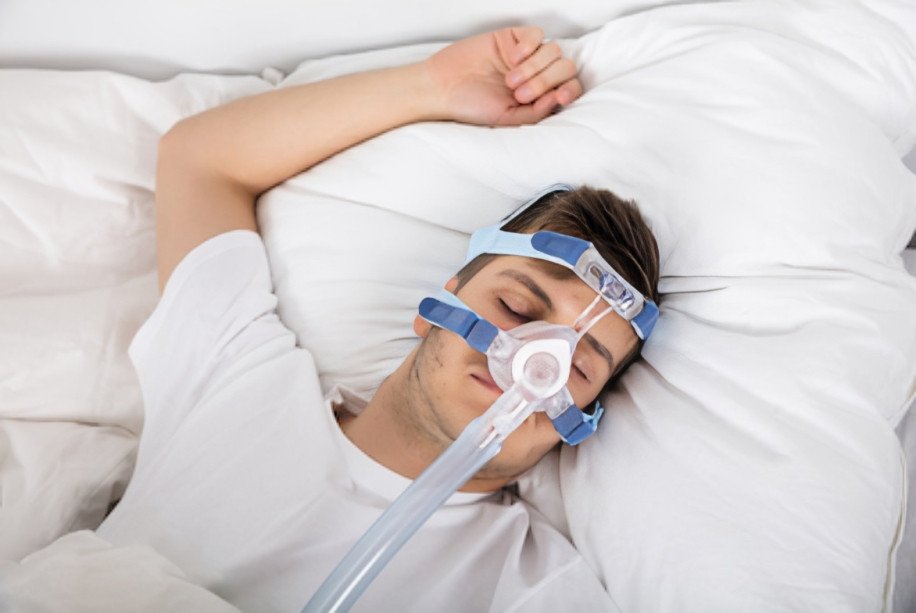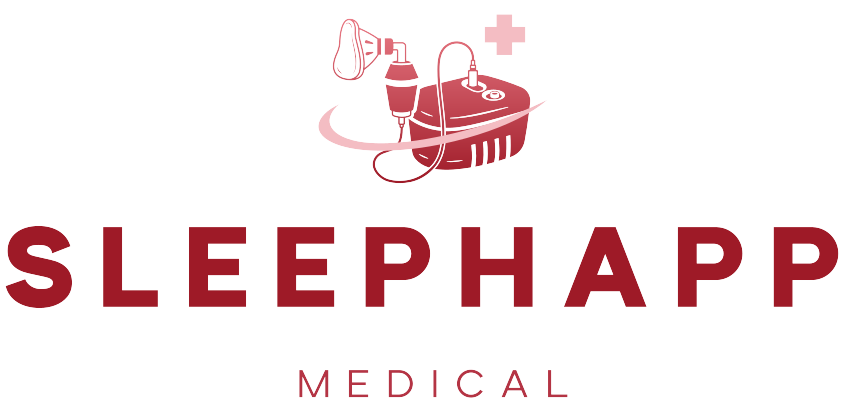How CPAP Machines Improve Sleep Quality for Sleep Apnea Patients
Home » How CPAP Machines Improve Sleep Quality for Sleep Apnea Patients

Table of Contents
About 25 million Americans have Obstructive Sleep Apnea (OSA) every night. CPAP machines help by blowing air. This air keeps the airway open. It makes breathing easier while sleeping.But only 60% of people with sleep apnea use a CPAP machine every night. It can be hard to get used to. But using it regularly is important because sleep apnea will not go away on its own. Sleep apnea affects health, mood, and quality of life. People with sleep apnea find it hard to get good sleep. CPAP machines are a common treatment for this problem. They help people sleep better and feel healthier.
In this blog, we will talk about sleep apnea. We will explain how CPAP machines work and why they help people sleep better.
What is Sleep Apnea?
Sleep apnea is a serious sleep problem. It causes your breathing to stop and start many times while you sleep. If you snore loudly and feel tired even after sleeping all night, you may have sleep apnea. You should see your doctor if someone says you snore or gasp while sleeping. Also, if you feel very sleepy during the day, it could be a sign of sleep apnea.
There are three main types of sleep apnea:
- Obstructive Sleep Apnea (OSA): This occurs when you regularly find your upper airway blocked while asleep. It either completely stops or greatly slows airflow.
- Central Sleep Apnea (CSA): Your brain fails to send the signals needed for breathing, which causes this condition. Certain medical conditions can affect your brain’s control over chest muscles and the airway, leading to central sleep apnea.
- Complex (or Mixed) Sleep Apnea – A combination of both obstructive and central sleep apnea.
The Importance of Sleep for Health and Well-Being
Sleep is very important for our health and well-being.
During sleep, our body:
- Fixes and heals tissues.
- Builds bones and muscles.
- Strengthens the immune system.
Sleep helps with:
- Brain function.
- Learning new things.
- Remembering information.
Not getting enough sleep can cause health problems like:
- Obesity (gaining too much weight).
- Diabetes (a problem with blood sugar).
- Heart disease.
- Depression (feeling very sad).
What is a CPAP Machine?
A CPAP (continuous positive airway pressure) machine is a medical tool used to treat sleep apnea, a disorder whereby breathing pauses and starts during sleep. It runs pressurized air steadily through a nasal interface or mask. A CPAP machine consists mostly of a motor, a humidifier, and a mask. APAP and BiPAP are two further forms of PAP devices.
How CPAP Machines Work
CPAP machines help people breathe better while they sleep. They send a steady stream of pressurized air into the nose and mouth. This keeps the airways open.
A CPAP machine consists in four main components: a compressor, an air filter, a tube, and a mask. The compressor produces pressurized air. The air filter removes dust and other particles so purifying the air. The pristine air passes via a flexible tube. The air from this tube reaches a mask fit over the mouth or nose.
Every blockage in the airway is softly pushed against by the CPAP machine’s air. This facilitates more oxygen reaching the lungs and opens the airways. This helps the machine stop sleep apnea’s interruptions of breathing. Better and more peaceful sleeping follows from this. For more information, you can visit CPAP Machines Work.
How a CPAP Machine Operates
Ambient air comes in through a filter and is pressurized. The devices create water pressure from 4 centimeters (CWP) to a maximum of 25 CWP. This air goes through a heated humidifier and is sent to the nasal mask through a tube.
The constant airflow creates a barrier in the upper airway. This barrier stops the throat from collapsing. It also keeps the soft palate, uvula, and tongue from blocking the airway. This helps reduce snoring and can ease swelling in the nose, clearing mucus from the airway. As a result, breathing becomes normal, and sleep quality improves.
What Are the Benefits of CPAP Therapy?
A CPAP machine helps keep your airways open while you sleep. This allows you to get the oxygen you need. Using a CPAP machine can improve your sleep quality. It can also lower your risk for health problems like heart disease and stroke. Learn more information on the benefits of CPAP therapy. Here’s how it can improve your overall quality of life:
- Through better sleep, CPAP treatment lessens daytime drowsiness, reducing the risk of car accidents and other safety concerns.
- Regular CPAP use can help to support cardiovascular health by lowering blood pressure.
- Improved sleep enhances mental clarity, memory, and focus, positively affecting daily activities and general wellbeing.
- CPAP therapy can reduce tiredness, enabling users to feel more present and energetic in their personal relationships.
- Quality sleep plays a vital role in blood sugar control, making CPAP a helpful tool for diabetics.
- CPAP users often experience better health outcomes and may visit the hospital less frequently.
How CPAP Machines Improve Sleep Quality
A CPAP machine can help you sleep better. It improves your breathing during sleep. Learn more about how CPAP machines improve sleep.
Keeping Airways Open
Maintaining open airways is one key way CPAP machines enhance sleep. The throat muscles of those suffering with sleep apnea relax too much. The airway collapses and airflow is blocked as a result. Constant air pressure used in CPAP treatment keeps the airway open. This enables your nighttime normal breathing.
Reducing Breathing Pauses
CPAP therapy also reduces or even stops breathing pauses. When airways stay open, oxygen levels stay stable. This means fewer disruptions in sleep. You wake up less often and have fewer moments of gasping or choking during the night.
Enhancing Sleep Stages
Deep sleep is important for feeling good physically and mentally. Sleep apnea can stop you from reaching deep sleep stages because of constant waking. CPAP therapy helps reduce these interruptions. This lets you enter deeper sleep stages, like REM (Rapid Eye Movement) sleep. These stages are crucial for mental clarity and emotional health.
More Energy During the Day
You feel more vibrant and attentive during the day when you sleep well. Sleep disruptions cause many people with sleep apnea extreme tiredness. CPAP treatment lessens daytime tiredness by raising the quality of sleep. Higher quality of living and improved output follow from this.
Improved Relationships
CPAP therapy helps relationships by stopping snoring. Snoring can disturb sleep for both partners. Better sleep makes people less frustrated. It also boosts energy and happiness. This leads to a stronger and more peaceful connection.
Choosing the Right CPAP Machine and Mask
Treating sleep apnea depends much on the choice of CPAP machine and mask. Given so many options, one can get lost. These considerations should help you decide on a CPAP machine and mask.
Type of Machine
- Fixed-Pressure CPAP: It keeps the air pressure steady all night long.
- Auto-CPAP (APAP): It changes the air pressure based on what you need at the time, making it more comfortable.
- BiPAP (Bi-Level Positive Airway Pressure): It uses two different pressure levels for breathing in and out. It’s good for more complex cases.
Selecting the Right Mask
The type of mask you pick depends on how you breathe, what feels comfortable, and the type of sleep apnea you have. Here are some common CPAP mask types:
- Nasal masks: These cover your nose. They work well for people who breathe mostly through their nose.
- Full-face masks: They cover your nose and mouth. They are helpful for people who breathe through their mouth. People with a stuffy nose will also benefit from them.
- Nasal pillow masks: Little cushions in these sit just under the nostrils. For those wishing less coverage, they are a basic choice.
- Oral masks: These cover the mouth only and work well for people who breathe through their mouth.
CPAP Machine Features to Consider
When choosing a CPAP machine, look for features that improve comfort and make the machine work better:
- Pressure settings: Choose a machine that lets you fit your requirements by varying the airflow pressure.
- Humidifier: A heated humidifier increases comfort during therapy. It helps prevent dry mouth and a stuffy nose.
- Portability:If you travel often, choose a machine that is light. Make sure it is easy to carry.
- Noise level: Choose a quiet machine so it doesn’t disturb your sleep.
- Data tracking: Certain devices can monitor your sleep patterns and enable you to change treatment as necessary.
Consider these factors to choose a CPAP machine and mask that fits your needs. This can help you sleep better and stay healthy.
How to Overcome Challenges in CPAP Therapy
Finding the right mask is important for comfort. If the mask does not fit well, it can hurt your face or feel uncomfortable. For more information about overcoming challenges in CPAP therapy.
- The airflow from the CPAP machine can make your mouth, nose, or throat feel dry.
- A humidifier can add moisture to the air. This helps prevent dryness.
- Drinking water during the day keeps your airways moist.
- It may take time to get used to the CPAP mask and machine.
- Some people feel anxious or trapped. Others may not like the sound or airflow.
- Start by wearing the mask for a short time each night. Slowly increase the time you wear it. Use relaxation techniques to help.
- If you have problems with fitting, settings, or anything else, talk to your healthcare provider or CPAP supplier.
- You can also join online CPAP support groups for advice and help from others.
- Adjusting to CPAP therapy takes patience. Most people notice better sleep over time.
- Regular check-ins with your healthcare provider will help keep your therapy on track.
The Future of CPAP Technology
Innovation keeps improving CPAP machines for sleep apnea. Newer models are quieter and smaller. They also have smart features, like:
- Automatic pressure adjustment changes pressure based on real-time needs.
- Remote monitoring allows doctors to track progress and adjust settings remotely.
- Portable CPAP machines are available for easy travel.
Conclusion
CPAP machines are helpful for people who have sleep apnea. They keep airways open, reduce breathing stops, and improve sleep. This helps people sleep better and feel healthier, both physically and mentally. CPAP therapy can also help with other health problems like high blood pressure and diabetes. It can even reduce snoring, which can improve relationships.
It can be hard to get used to a CPAP machine at first. But with the right equipment, patience, and support, most people can adjust. CPAP technology is improving, with features like automatic pressure adjustments and remote monitoring. This means better sleep for people who need it. By picking the right CPAP machine and mask, people can manage their sleep apnea and feel better overall.
